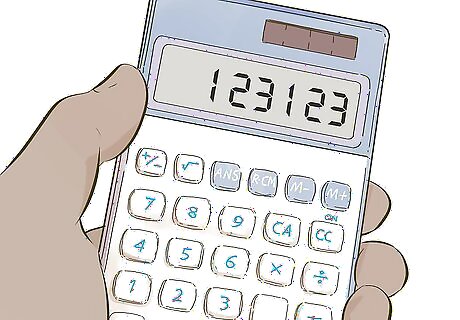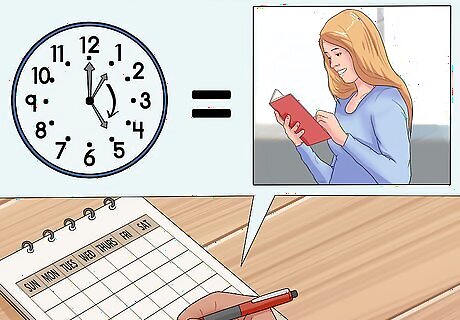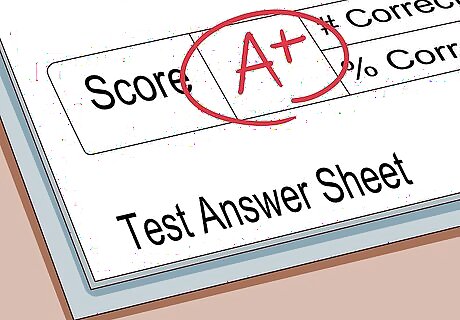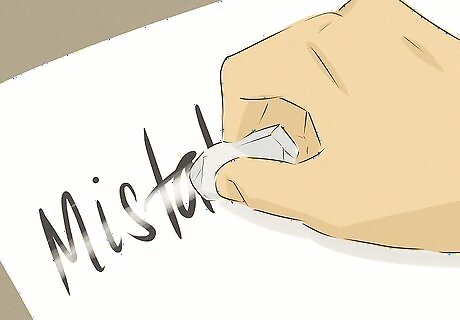
views

Reflect. Reflect about what went wrong during the exam. Ask yourself some questions. What could you have done differently? Did you understand the material? If so, how was your test taking environment? Did you have a good breakfast, get enough sleep, or were distracted? If you felt unprepared, did you study the wrong thing? Did you not study or manage your time well enough? Get to the core of the problem and figure out what you will do differently in the future. Make sure to write down how you felt when taking the test and jot down a few quick notes on how you could do better next time.

Take some time to relax. After failing a test, you are bound to feel some disappointment in yourself. Instead of jumping right on the next train take a day to regroup. Watch your favorite movie, hang out with some friends, or delve into another subject in the meantime. Don't stay on this step for more than a day though - life goes on and you need to get started on improving your tactics for the next exam.

Assess the damage. Consider the impact this one exam has on your overall grade. A lot of professors make their syllabus so that one failed exam won't make or break your grade. They can do this by including an exam drop or using your final exam score to replace your lowest exam score, provided it is better. Use the course syllabus to calculate the minimum score on each exam and homework assignment that you need to pass (or get the grade you want), and then use this information to adjust.

Don't panic. Panicking isn't going to get you anywhere. Make sure to keep things in perspective. If you do fail this course it will not be the end of the world. College students retake failed courses all the time and doing so is a perfectly normal thing to happen in your academic career. Sometimes it takes more than one try to learn a difficult subject. Staying calm and collected will help you develop a game plan which will hopefully lead to your success. This failure is an experience that will help you do better on the next exam. Remember, you are not alone and are capable of getting a better grade.

Understand what led you to fail. Take the time to understand why you didn't perform well. Incorporate the notes you took in step 1 after failing the exam and look for correlations. In order to fix your mistakes and succeed on the next test you need to understand exactly what you did wrong the first time.

Talk to your professor or teaching assistant. Make sure to talk to your professor or teaching assistant as soon as you can. Professors may seem intimidating, but they are educators and their job is to help you, the student, succeed. Reaching out to a professor and explaining to them that you are having trouble can allow them to explain the concepts to you in a different way or explain how they think you can improve. Professors can also recommend ways they think are best to study for their course. Reaching out sooner rather than later is crucial, doing this early shows the professor that you care and are willing to work for your grade.

Make a plan. You need to be an organized student in order to address the mistakes you made the first time around as well as incorporating new ways to study. Create a calendar of upcoming deadlines in your class and use those to adequately prepare for your next exam. Make sure you are maximizing your efficiency and studying even weeks ahead instead of days. Plan out what you are going to study and when, doing this will make it easier to get started and you will be less likely to get overwhelmed.

Be realistic. Don't expect to get a perfect score on the next exam - that will only land you in more disappointment. Instead, focus on improving your study methods and test scores. Any small improvement is still progression and keeping that in mind is key.

Make real changes. In order to go about change you need to remain accountable. Schedule study sessions with classmates or by yourself and follow through. The most difficult part to this process is actually making the changes to your studying or test taking habits that will lead to an improved score. Many students would rather stick to what they are comfortable with and already know, however, other peers or tutors can have different studying methods that are better suited for the course you are taking or the type of student you are. Incorporate step 6 into this process.

Get help. Don't be embarrassed to ask for help. A lot of students can feel that they can improve on their own or are too stubborn to reach out and ask for help. This will lead to failure in the long run as continuing the same path will lead to similar scores. You can get help by finding a tutor, utilizing your professors office hours, asking questions in class, and starting group chats with classmates.

Learn from your mistakes. Recognizing that you have made a mistake is the easy part, the difficult part is keeping that motivation to change your habits. If you keep failing exams over and over there is something that you are missing and you need to address the root cause of that. Do not repeat what you have always done and expect different results. This applies to every course you take in your college career.

Be optimistic and confident. Staying realistic has already been mentioned, but it is also important to have faith in yourself and your abilities. Walking into an exam knowing that you studied your absolute hardest and are prepared for the material in front of you is a feeling of accomplishment. According to studies, students with low levels of test anxiety are more likely to achieve higher scores on multiple choice question examinations than students with higher anxiety levels. If you walk into an exam thinking that you are going to fail, chances are that you already have.




















Comments
0 comment